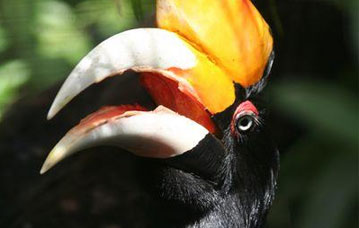Hunting, deforestation wipe out 6 of 7 hornbill species in Borneo park
Hunting, deforestation wipe out 6 of 7 hornbill species in Borneo park
mongabay.com
June 14, 2008
Logging, forest conversion for palm oil, and hunting have triggered a precipitous drop in key wildlife populations in Malaysia’s Lambir Hills National Park, on the island of Borneo, said a biologist speaking at a scientific conference in Paramaribo, Suriname.
Rhett Harrison, a Smithsonian Tropical Research Institute (STRI) associate researcher and Secretary for the Asia-Pacific Chapter of the Association for Tropical Biology and Conservation (ATBC), said that six of the park’s seven species of hornbills have disappeared since 1980, while the number of carnivore, raptor, and primate species have also declined significantly. At least 11 mammal species and 23 bird species have been last from Lambir.
 Rhinoceros Hornbill |
Harrison said the losses appear to be having ecological impacts by affecting the reproductive capacities of trees dependent on animal dispersal of their seeds, particularly figs. Surprising Harrison also reported a decline in trees with seeds that are not dispersed by animals, suggesting that forces beyond hunting are impacting the forest. Harrison said that large-scale landscape changes, including a “massive contraction” of quality forest around Lambir are likely having an effect.
Harrison said that conservation efforts at Lambir need to focus on law enforcement to protect wildlife from hunting and illegal incursions in the park.
“There are large areas of good forest habitat that are empty of wildlife,” he said. “We need to focus on enforcement rather than habitat expansion efforts.”
“Unles action is taken to restore the vertebrate community and establish buffer zones, a continued degradation of Lambir’s forest can be expected.”














